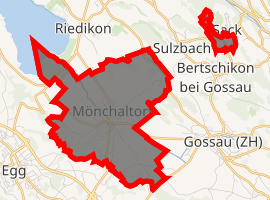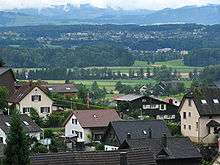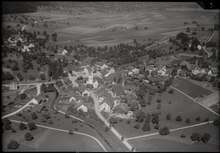Mönchaltorf
Mönchaltorf is a municipality in the district of Uster in the canton of Zürich in Switzerland.
Mönchaltorf | |
|---|---|
 Coat of arms | |
Location of Mönchaltorf 
| |
 Mönchaltorf  Mönchaltorf | |
| Coordinates: 47°19′N 8°43′E | |
| Country | Switzerland |
| Canton | Zurich |
| District | Uster |
| Government | |
| • Mayor | Annemarie Beglinger |
| Area | |
| • Total | 7.62 km2 (2.94 sq mi) |
| Elevation | 442 m (1,450 ft) |
| Population (2018-12-31)[2] | |
| • Total | 3,769 |
| • Density | 490/km2 (1,300/sq mi) |
| Postal code | 8617 |
| SFOS number | 0196 |
| Surrounded by | Egg, Gossau, Maur, Seegräben, Uster, Wetzikon |
| Website | www SFSO statistics |
History
Mönchaltorf is first mentioned in 741 as Villa Altorf. In 872 it was mentioned as Altorf monachorum.[3] It also holds the record for the longest Apfel Strudel.
Geography


Mönchaltorf has an area of 7.6 km2 (2.9 sq mi). Of this area, 70.1% is used for agricultural purposes, while 11.2% is forested. Of the rest of the land, 15.7% is settled (buildings or roads) and the remainder (3%) is non-productive (rivers, glaciers or mountains).[4] In 1996 housing and buildings made up 12.1% of the total area, while transportation infrastructure made up the rest (3.7%).[5] Of the total unproductive area, water (streams and lakes) made up 0.3% of the area. As of 2007 12.8% of the total municipal area was undergoing some type of construction.[5]
Demographics
Mönchaltorf has a population (as of 31 December 2018) of 3,769.[6] As of 2007, 11.6% of the population was made up of foreign nationals. As of 2008 the gender distribution of the population was 48.8% male and 51.2% female. Over the last 10 years the population has grown at a rate of 3.7%. Most of the population (as of 2000) speaks German (92.3%), with Italian being second most common ( 1.7%) and French being third ( 1.0%).
In the 2007 election the most popular party was the SVP which received 39.2% of the vote. The next three most popular parties were the SPS (20.9%), the CSP (11.9%) and the FDP (11.7%).
The age distribution of the population (as of 2000) is children and teenagers (0–19 years old) make up 23.6% of the population, while adults (20–64 years old) make up 66.7% and seniors (over 64 years old) make up 9.8%. In Mönchaltorf about 83.9% of the population (between age 25-64) have completed either non-mandatory upper secondary education or additional higher education (either university or a Fachhochschule). There are 1336 households in Mönchaltorf.[5]
Mönchaltorf has an unemployment rate of 1.87%. As of 2005, there were 110 people employed in the primary economic sector and about 36 businesses involved in this sector. 367 people are employed in the secondary sector and there are 37 businesses in this sector. 602 people are employed in the tertiary sector, with 119 businesses in this sector.[4] As of 2007 50% of the working population were employed full-time, and 50% were employed part-time.[5]
As of 2008 there were 733 Catholics and 1582 Protestants in Mönchaltorf. In the 2000 census, religion was broken down into several smaller categories. From the census, 56.1% were some type of Protestant, with 50.7% belonging to the Swiss Reformed Church and 5.5% belonging to other Protestant churches. 23.9% of the population were Catholic. Of the rest of the population, 0% were Muslim, 3.2% belonged to another religion (not listed), 2.7% did not give a religion, and 13.4% were atheist or agnostic.[5]
Population growth
The following table shows the population development of Möchaltorf.
| Population Development | |
|---|---|
| Year | Inhabitants:[3] |
| 1771 | 695 |
| 1850 | 1148 |
| 1860 | 1189 |
| 1900 | 804 |
| 1941 | 706 |
| 1950 | 837 |
| 1960 | 1023 |
| 1970 | 1604 |
| 1980 | 2863 |
| 1990 | 3494 |
| 2000 | 3183 |
Politics
Mayor is Annemarie Beglinger-Vögeli (FDP). Former mayors were Gustav Stehli (SVP), Felix Hess (SVP) and until 2006 Ruedi Lerch (FDP).[7]
| Member of the municipal council (2014–2018) | |||
|---|---|---|---|
| Name | Beginning | Task | Party |
| Beglinger-Vögeli Annemarie | 2002 | Mayor / presidential / plan / development | FDP |
| Schlumpf Marlis | 2016 | society | SP |
| Fürst Rudolf | 2004 | security | SVP |
| Galliker Hans-Rudolf | 2010 | education | FDP |
| Graf Urs | 2014 | underground work | independent |
| Kaderli Bernhard | 2014 | finance / economy | FDP |
| Larry-Hug Andrea | 2014 | high building / property / culture | SP |
Gallery
 fontain in front of the Mönchhof (meeting point)
fontain in front of the Mönchhof (meeting point) Restaurant Mühle(Mill)
Restaurant Mühle(Mill) vintage house in the middle of Mönchaltorf
vintage house in the middle of Mönchaltorf runnel which flows to Greifensee
runnel which flows to Greifensee
References
- "Arealstatistik Standard - Gemeinden nach 4 Hauptbereichen". Federal Statistical Office. Retrieved 13 January 2019.
- "Ständige Wohnbevölkerung nach Staatsangehörigkeitskategorie Geschlecht und Gemeinde; Provisorische Jahresergebnisse; 2018". Federal Statistical Office. 9 April 2019. Retrieved 11 April 2019.
- Mönchaltorf in German, French and Italian in the online Historical Dictionary of Switzerland.
- Swiss Federal Statistical Office accessed 14-Aug-2009
- Statistics Zurich (in German) accessed 4 August 2009
- Swiss Federal Statistical Office - STAT-TAB, online database – Ständige und nichtständige Wohnbevölkerung nach institutionellen Gliederungen, Geburtsort und Staatsangehörigkeit (in German) accessed 23 September 2019
- http://www.tagesanzeiger.ch/zuerich/Eveline-Widmer-I-kume-us-Moenchaltorf/story/21341772 accessed 14 April 2017 (in German)
External links
| Wikimedia Commons has media related to Mönchaltorf. |
- Offizielle Website der Gemeinde Mönchaltorf (in German)
- Statistische Daten des Kantons zur Gemeinde Mönchaltorf (in German)
- Mönchaltorf in German, French and Italian in the online Historical Dictionary of Switzerland.
- Gemeinde Mönchaltorf im GIS des Kantons Zürich (in German)